Hildegard Peplau's Interpersonal Theory: Impact on Nursing Practice
VerifiedAdded on 2022/11/10
|14
|3549
|340
Essay
AI Summary
This essay examines Hildegard Peplau's interpersonal theory and its profound influence on nursing practice. It delves into the historical context of Peplau's work, emphasizing her contributions to psychiatric nursing and the development of the nurse-patient relationship as a therapeutic process. The paper highlights the significance of her patient-centered approach, the four phases of the interpersonal process (orientation, identification, exploitation, and resolution), and the six nursing roles. It discusses how Peplau's theory enhances nursing knowledge and improves patient outcomes across various nursing specialities, including nephrology and abortion care. The essay provides examples from literature and underscores the importance of understanding and applying Peplau's theory for effective and holistic nursing care. The assignment emphasizes how Peplau's work continues to shape contemporary nursing practices, fostering therapeutic communication, and promoting positive patient experiences.
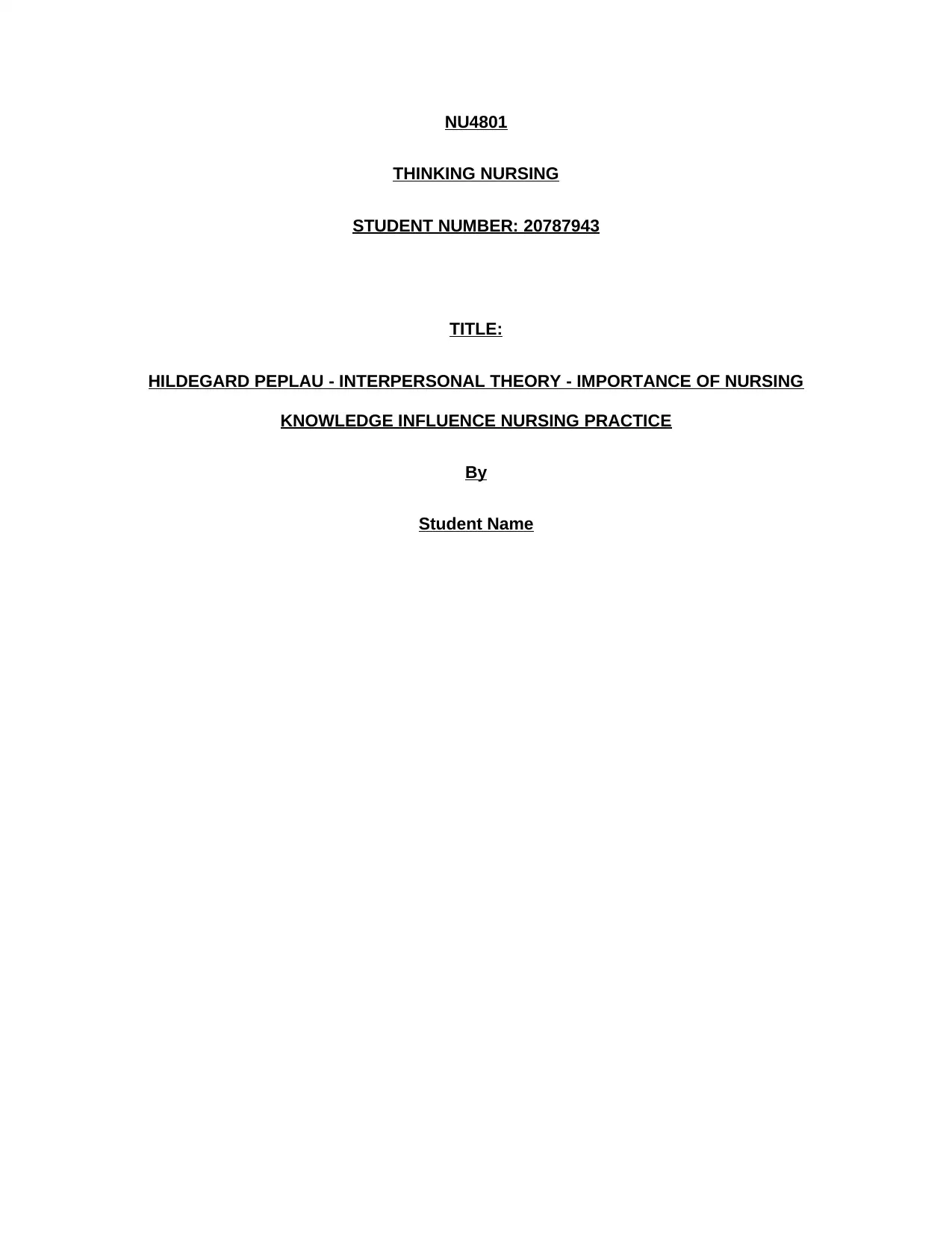
NU4801
THINKING NURSING
STUDENT NUMBER: 20787943
TITLE:
HILDEGARD PEPLAU - INTERPERSONAL THEORY - IMPORTANCE OF NURSING
KNOWLEDGE INFLUENCE NURSING PRACTICE
By
Student Name
THINKING NURSING
STUDENT NUMBER: 20787943
TITLE:
HILDEGARD PEPLAU - INTERPERSONAL THEORY - IMPORTANCE OF NURSING
KNOWLEDGE INFLUENCE NURSING PRACTICE
By
Student Name
Paraphrase This Document
Need a fresh take? Get an instant paraphrase of this document with our AI Paraphraser
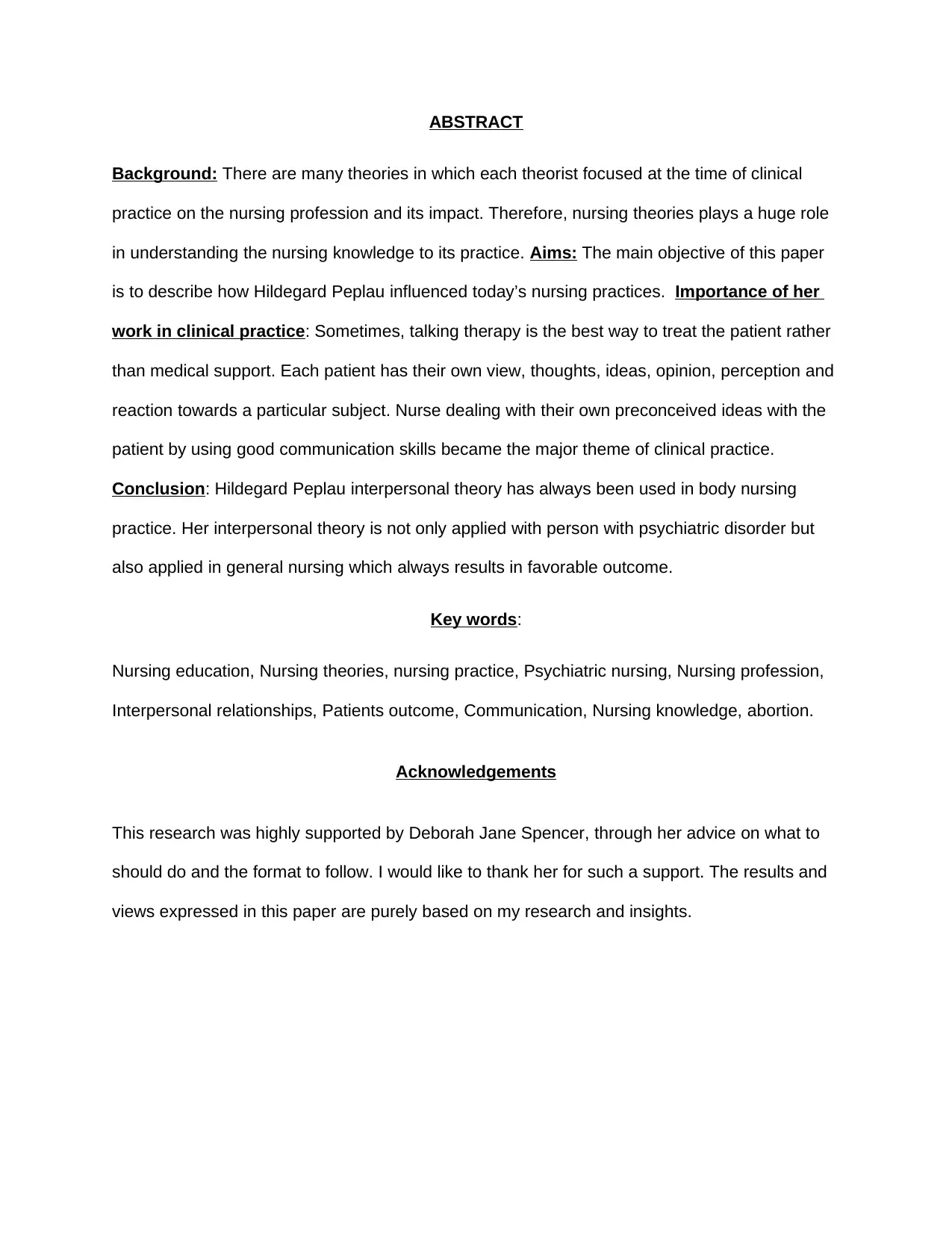
ABSTRACT
Background: There are many theories in which each theorist focused at the time of clinical
practice on the nursing profession and its impact. Therefore, nursing theories plays a huge role
in understanding the nursing knowledge to its practice. Aims: The main objective of this paper
is to describe how Hildegard Peplau influenced today’s nursing practices. Importance of her
work in clinical practice: Sometimes, talking therapy is the best way to treat the patient rather
than medical support. Each patient has their own view, thoughts, ideas, opinion, perception and
reaction towards a particular subject. Nurse dealing with their own preconceived ideas with the
patient by using good communication skills became the major theme of clinical practice.
Conclusion: Hildegard Peplau interpersonal theory has always been used in body nursing
practice. Her interpersonal theory is not only applied with person with psychiatric disorder but
also applied in general nursing which always results in favorable outcome.
Key words:
Nursing education, Nursing theories, nursing practice, Psychiatric nursing, Nursing profession,
Interpersonal relationships, Patients outcome, Communication, Nursing knowledge, abortion.
Acknowledgements
This research was highly supported by Deborah Jane Spencer, through her advice on what to
should do and the format to follow. I would like to thank her for such a support. The results and
views expressed in this paper are purely based on my research and insights.
Background: There are many theories in which each theorist focused at the time of clinical
practice on the nursing profession and its impact. Therefore, nursing theories plays a huge role
in understanding the nursing knowledge to its practice. Aims: The main objective of this paper
is to describe how Hildegard Peplau influenced today’s nursing practices. Importance of her
work in clinical practice: Sometimes, talking therapy is the best way to treat the patient rather
than medical support. Each patient has their own view, thoughts, ideas, opinion, perception and
reaction towards a particular subject. Nurse dealing with their own preconceived ideas with the
patient by using good communication skills became the major theme of clinical practice.
Conclusion: Hildegard Peplau interpersonal theory has always been used in body nursing
practice. Her interpersonal theory is not only applied with person with psychiatric disorder but
also applied in general nursing which always results in favorable outcome.
Key words:
Nursing education, Nursing theories, nursing practice, Psychiatric nursing, Nursing profession,
Interpersonal relationships, Patients outcome, Communication, Nursing knowledge, abortion.
Acknowledgements
This research was highly supported by Deborah Jane Spencer, through her advice on what to
should do and the format to follow. I would like to thank her for such a support. The results and
views expressed in this paper are purely based on my research and insights.
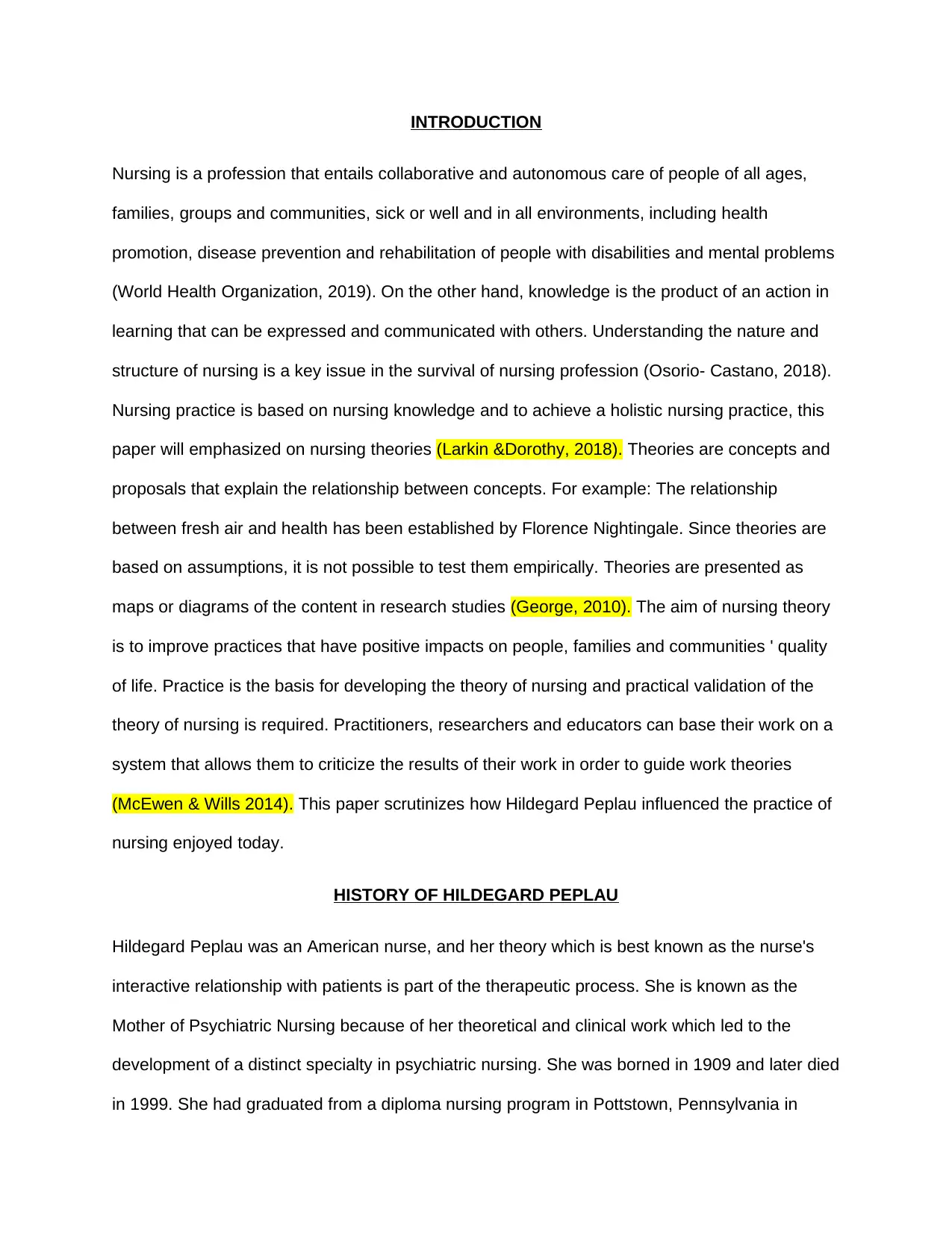
INTRODUCTION
Nursing is a profession that entails collaborative and autonomous care of people of all ages,
families, groups and communities, sick or well and in all environments, including health
promotion, disease prevention and rehabilitation of people with disabilities and mental problems
(World Health Organization, 2019). On the other hand, knowledge is the product of an action in
learning that can be expressed and communicated with others. Understanding the nature and
structure of nursing is a key issue in the survival of nursing profession (Osorio- Castano, 2018).
Nursing practice is based on nursing knowledge and to achieve a holistic nursing practice, this
paper will emphasized on nursing theories (Larkin &Dorothy, 2018). Theories are concepts and
proposals that explain the relationship between concepts. For example: The relationship
between fresh air and health has been established by Florence Nightingale. Since theories are
based on assumptions, it is not possible to test them empirically. Theories are presented as
maps or diagrams of the content in research studies (George, 2010). The aim of nursing theory
is to improve practices that have positive impacts on people, families and communities ' quality
of life. Practice is the basis for developing the theory of nursing and practical validation of the
theory of nursing is required. Practitioners, researchers and educators can base their work on a
system that allows them to criticize the results of their work in order to guide work theories
(McEwen & Wills 2014). This paper scrutinizes how Hildegard Peplau influenced the practice of
nursing enjoyed today.
HISTORY OF HILDEGARD PEPLAU
Hildegard Peplau was an American nurse, and her theory which is best known as the nurse's
interactive relationship with patients is part of the therapeutic process. She is known as the
Mother of Psychiatric Nursing because of her theoretical and clinical work which led to the
development of a distinct specialty in psychiatric nursing. She was borned in 1909 and later died
in 1999. She had graduated from a diploma nursing program in Pottstown, Pennsylvania in
Nursing is a profession that entails collaborative and autonomous care of people of all ages,
families, groups and communities, sick or well and in all environments, including health
promotion, disease prevention and rehabilitation of people with disabilities and mental problems
(World Health Organization, 2019). On the other hand, knowledge is the product of an action in
learning that can be expressed and communicated with others. Understanding the nature and
structure of nursing is a key issue in the survival of nursing profession (Osorio- Castano, 2018).
Nursing practice is based on nursing knowledge and to achieve a holistic nursing practice, this
paper will emphasized on nursing theories (Larkin &Dorothy, 2018). Theories are concepts and
proposals that explain the relationship between concepts. For example: The relationship
between fresh air and health has been established by Florence Nightingale. Since theories are
based on assumptions, it is not possible to test them empirically. Theories are presented as
maps or diagrams of the content in research studies (George, 2010). The aim of nursing theory
is to improve practices that have positive impacts on people, families and communities ' quality
of life. Practice is the basis for developing the theory of nursing and practical validation of the
theory of nursing is required. Practitioners, researchers and educators can base their work on a
system that allows them to criticize the results of their work in order to guide work theories
(McEwen & Wills 2014). This paper scrutinizes how Hildegard Peplau influenced the practice of
nursing enjoyed today.
HISTORY OF HILDEGARD PEPLAU
Hildegard Peplau was an American nurse, and her theory which is best known as the nurse's
interactive relationship with patients is part of the therapeutic process. She is known as the
Mother of Psychiatric Nursing because of her theoretical and clinical work which led to the
development of a distinct specialty in psychiatric nursing. She was borned in 1909 and later died
in 1999. She had graduated from a diploma nursing program in Pottstown, Pennsylvania in
⊘ This is a preview!⊘
Do you want full access?
Subscribe today to unlock all pages.

Trusted by 1+ million students worldwide
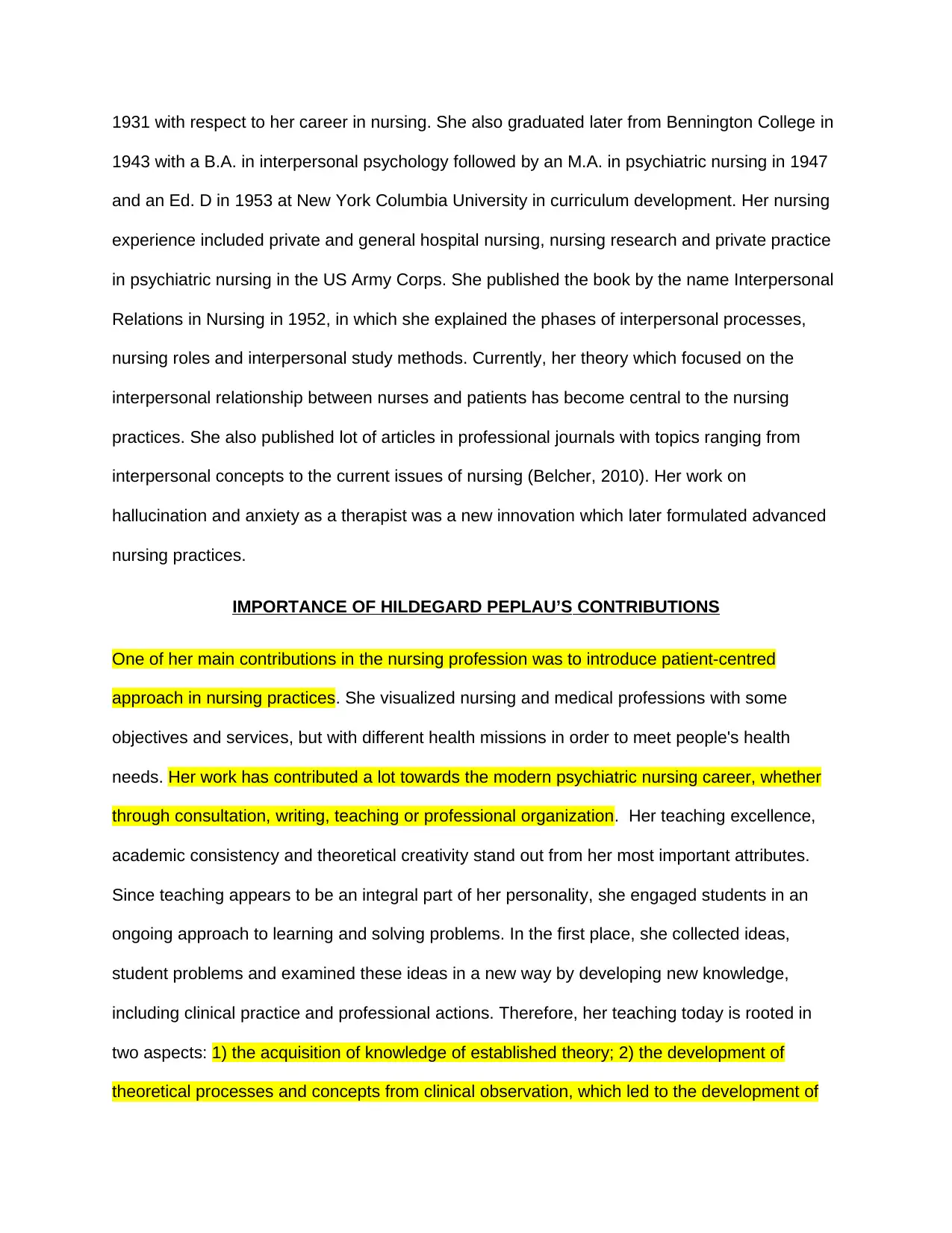
1931 with respect to her career in nursing. She also graduated later from Bennington College in
1943 with a B.A. in interpersonal psychology followed by an M.A. in psychiatric nursing in 1947
and an Ed. D in 1953 at New York Columbia University in curriculum development. Her nursing
experience included private and general hospital nursing, nursing research and private practice
in psychiatric nursing in the US Army Corps. She published the book by the name Interpersonal
Relations in Nursing in 1952, in which she explained the phases of interpersonal processes,
nursing roles and interpersonal study methods. Currently, her theory which focused on the
interpersonal relationship between nurses and patients has become central to the nursing
practices. She also published lot of articles in professional journals with topics ranging from
interpersonal concepts to the current issues of nursing (Belcher, 2010). Her work on
hallucination and anxiety as a therapist was a new innovation which later formulated advanced
nursing practices.
IMPORTANCE OF HILDEGARD PEPLAU’S CONTRIBUTIONS
One of her main contributions in the nursing profession was to introduce patient-centred
approach in nursing practices. She visualized nursing and medical professions with some
objectives and services, but with different health missions in order to meet people's health
needs. Her work has contributed a lot towards the modern psychiatric nursing career, whether
through consultation, writing, teaching or professional organization. Her teaching excellence,
academic consistency and theoretical creativity stand out from her most important attributes.
Since teaching appears to be an integral part of her personality, she engaged students in an
ongoing approach to learning and solving problems. In the first place, she collected ideas,
student problems and examined these ideas in a new way by developing new knowledge,
including clinical practice and professional actions. Therefore, her teaching today is rooted in
two aspects: 1) the acquisition of knowledge of established theory; 2) the development of
theoretical processes and concepts from clinical observation, which led to the development of
1943 with a B.A. in interpersonal psychology followed by an M.A. in psychiatric nursing in 1947
and an Ed. D in 1953 at New York Columbia University in curriculum development. Her nursing
experience included private and general hospital nursing, nursing research and private practice
in psychiatric nursing in the US Army Corps. She published the book by the name Interpersonal
Relations in Nursing in 1952, in which she explained the phases of interpersonal processes,
nursing roles and interpersonal study methods. Currently, her theory which focused on the
interpersonal relationship between nurses and patients has become central to the nursing
practices. She also published lot of articles in professional journals with topics ranging from
interpersonal concepts to the current issues of nursing (Belcher, 2010). Her work on
hallucination and anxiety as a therapist was a new innovation which later formulated advanced
nursing practices.
IMPORTANCE OF HILDEGARD PEPLAU’S CONTRIBUTIONS
One of her main contributions in the nursing profession was to introduce patient-centred
approach in nursing practices. She visualized nursing and medical professions with some
objectives and services, but with different health missions in order to meet people's health
needs. Her work has contributed a lot towards the modern psychiatric nursing career, whether
through consultation, writing, teaching or professional organization. Her teaching excellence,
academic consistency and theoretical creativity stand out from her most important attributes.
Since teaching appears to be an integral part of her personality, she engaged students in an
ongoing approach to learning and solving problems. In the first place, she collected ideas,
student problems and examined these ideas in a new way by developing new knowledge,
including clinical practice and professional actions. Therefore, her teaching today is rooted in
two aspects: 1) the acquisition of knowledge of established theory; 2) the development of
theoretical processes and concepts from clinical observation, which led to the development of
Paraphrase This Document
Need a fresh take? Get an instant paraphrase of this document with our AI Paraphraser
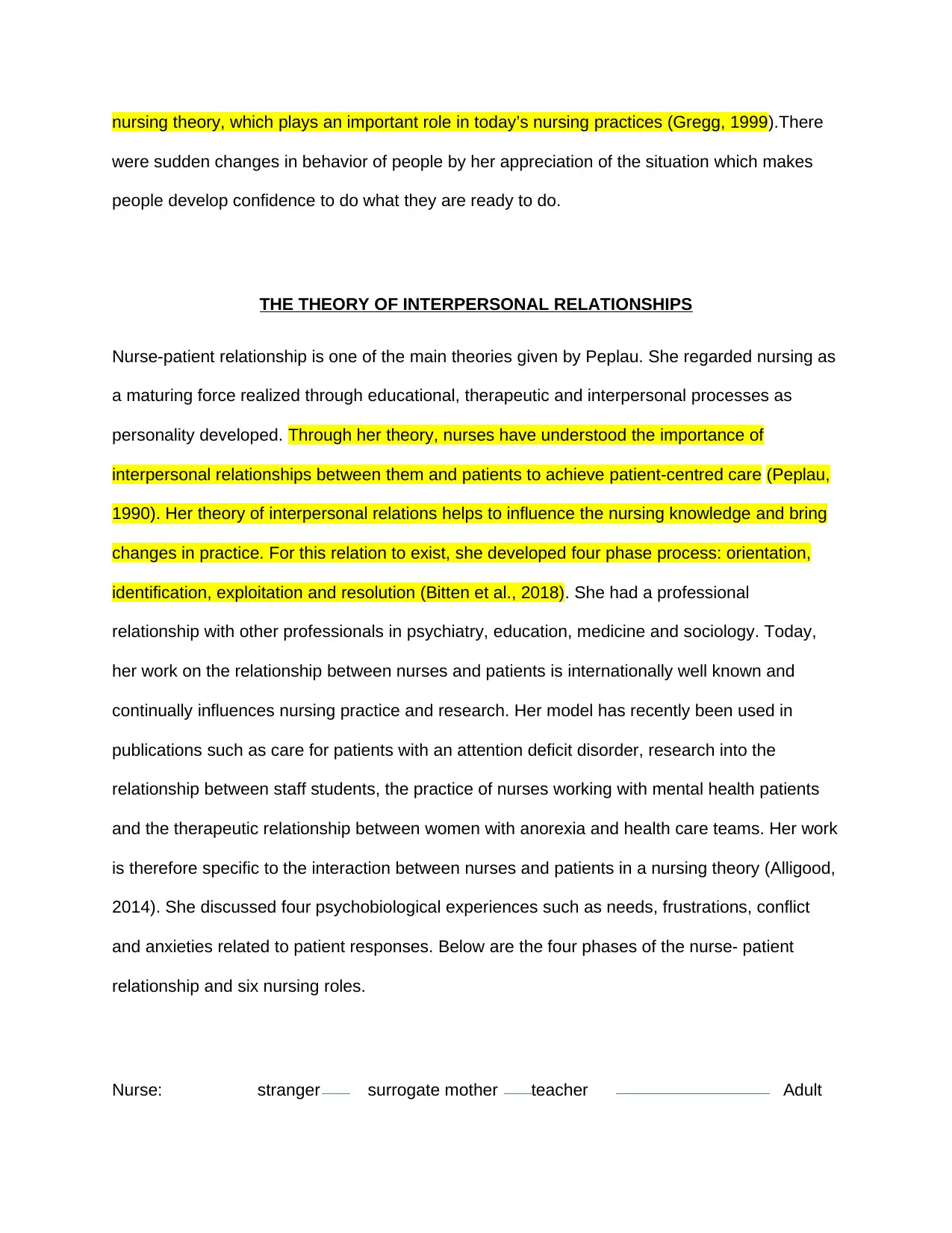
nursing theory, which plays an important role in today’s nursing practices (Gregg, 1999).There
were sudden changes in behavior of people by her appreciation of the situation which makes
people develop confidence to do what they are ready to do.
THE THEORY OF INTERPERSONAL RELATIONSHIPS
Nurse-patient relationship is one of the main theories given by Peplau. She regarded nursing as
a maturing force realized through educational, therapeutic and interpersonal processes as
personality developed. Through her theory, nurses have understood the importance of
interpersonal relationships between them and patients to achieve patient-centred care (Peplau,
1990). Her theory of interpersonal relations helps to influence the nursing knowledge and bring
changes in practice. For this relation to exist, she developed four phase process: orientation,
identification, exploitation and resolution (Bitten et al., 2018). She had a professional
relationship with other professionals in psychiatry, education, medicine and sociology. Today,
her work on the relationship between nurses and patients is internationally well known and
continually influences nursing practice and research. Her model has recently been used in
publications such as care for patients with an attention deficit disorder, research into the
relationship between staff students, the practice of nurses working with mental health patients
and the therapeutic relationship between women with anorexia and health care teams. Her work
is therefore specific to the interaction between nurses and patients in a nursing theory (Alligood,
2014). She discussed four psychobiological experiences such as needs, frustrations, conflict
and anxieties related to patient responses. Below are the four phases of the nurse- patient
relationship and six nursing roles.
Nurse: stranger surrogate mother teacher Adult
were sudden changes in behavior of people by her appreciation of the situation which makes
people develop confidence to do what they are ready to do.
THE THEORY OF INTERPERSONAL RELATIONSHIPS
Nurse-patient relationship is one of the main theories given by Peplau. She regarded nursing as
a maturing force realized through educational, therapeutic and interpersonal processes as
personality developed. Through her theory, nurses have understood the importance of
interpersonal relationships between them and patients to achieve patient-centred care (Peplau,
1990). Her theory of interpersonal relations helps to influence the nursing knowledge and bring
changes in practice. For this relation to exist, she developed four phase process: orientation,
identification, exploitation and resolution (Bitten et al., 2018). She had a professional
relationship with other professionals in psychiatry, education, medicine and sociology. Today,
her work on the relationship between nurses and patients is internationally well known and
continually influences nursing practice and research. Her model has recently been used in
publications such as care for patients with an attention deficit disorder, research into the
relationship between staff students, the practice of nurses working with mental health patients
and the therapeutic relationship between women with anorexia and health care teams. Her work
is therefore specific to the interaction between nurses and patients in a nursing theory (Alligood,
2014). She discussed four psychobiological experiences such as needs, frustrations, conflict
and anxieties related to patient responses. Below are the four phases of the nurse- patient
relationship and six nursing roles.
Nurse: stranger surrogate mother teacher Adult
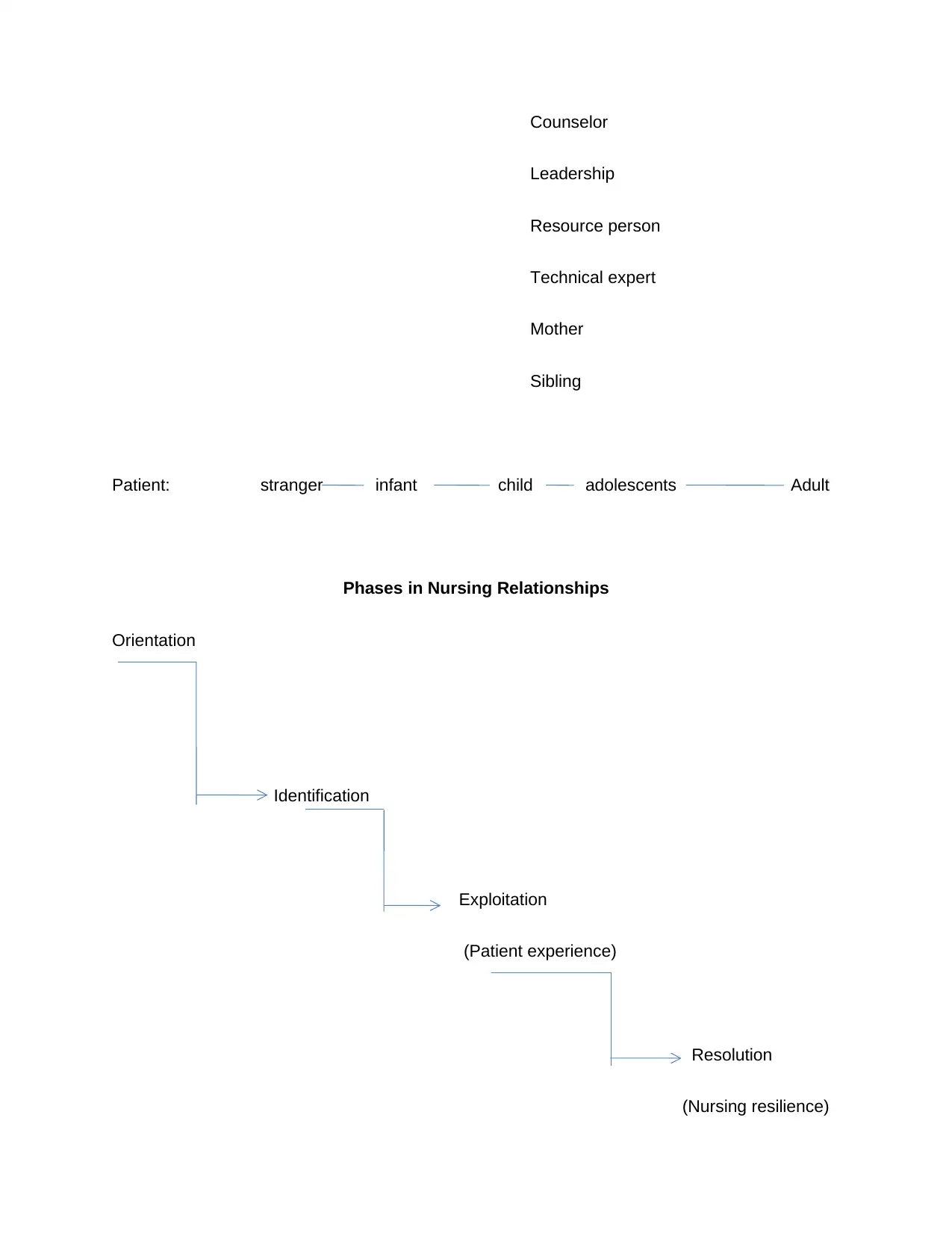
Counselor
Leadership
Resource person
Technical expert
Mother
Sibling
Patient: stranger infant child adolescents Adult
Phases in Nursing Relationships
Orientation
Identification
Exploitation
(Patient experience)
Resolution
(Nursing resilience)
Leadership
Resource person
Technical expert
Mother
Sibling
Patient: stranger infant child adolescents Adult
Phases in Nursing Relationships
Orientation
Identification
Exploitation
(Patient experience)
Resolution
(Nursing resilience)
⊘ This is a preview!⊘
Do you want full access?
Subscribe today to unlock all pages.

Trusted by 1+ million students worldwide
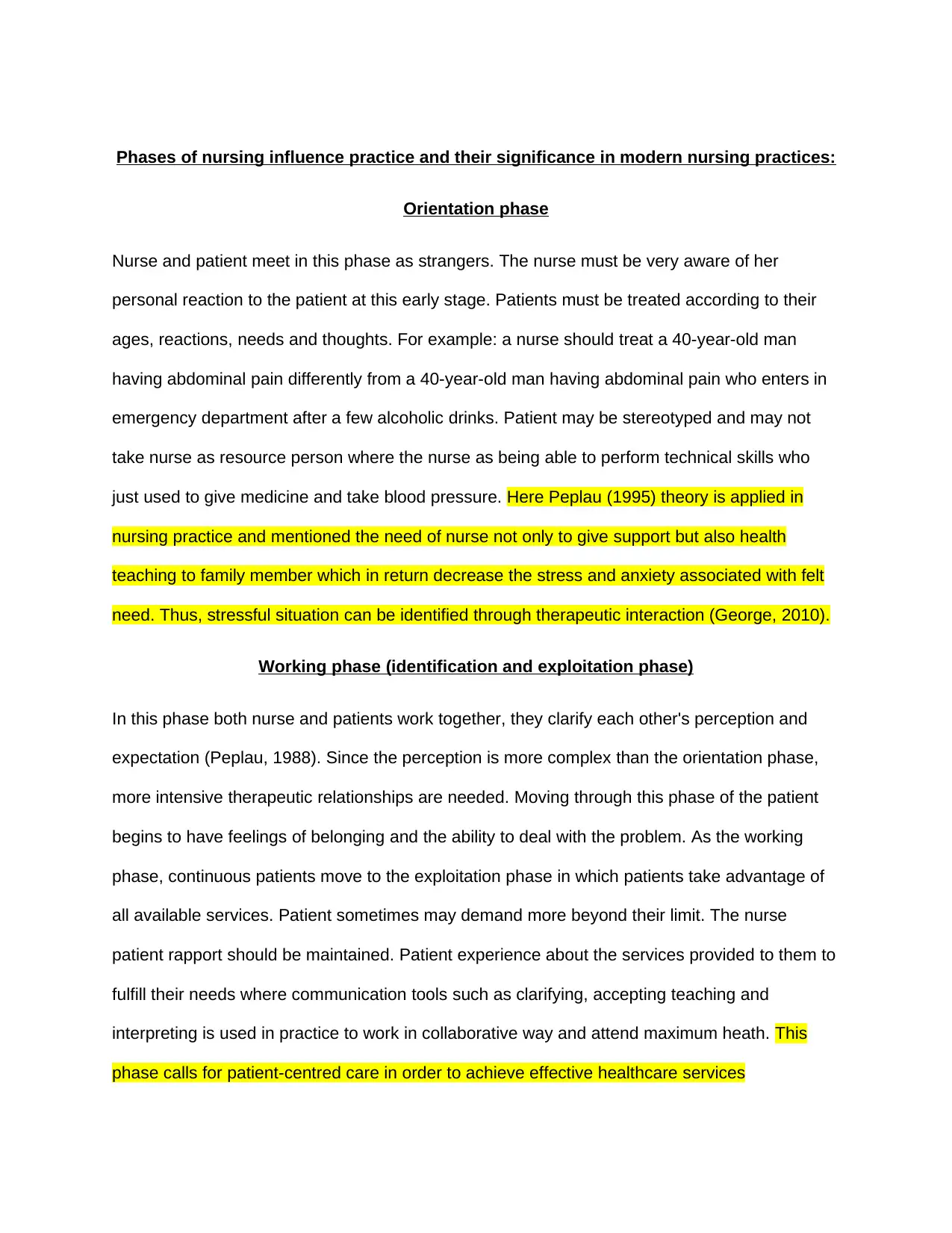
Phases of nursing influence practice and their significance in modern nursing practices:
Orientation phase
Nurse and patient meet in this phase as strangers. The nurse must be very aware of her
personal reaction to the patient at this early stage. Patients must be treated according to their
ages, reactions, needs and thoughts. For example: a nurse should treat a 40-year-old man
having abdominal pain differently from a 40-year-old man having abdominal pain who enters in
emergency department after a few alcoholic drinks. Patient may be stereotyped and may not
take nurse as resource person where the nurse as being able to perform technical skills who
just used to give medicine and take blood pressure. Here Peplau (1995) theory is applied in
nursing practice and mentioned the need of nurse not only to give support but also health
teaching to family member which in return decrease the stress and anxiety associated with felt
need. Thus, stressful situation can be identified through therapeutic interaction (George, 2010).
Working phase (identification and exploitation phase)
In this phase both nurse and patients work together, they clarify each other's perception and
expectation (Peplau, 1988). Since the perception is more complex than the orientation phase,
more intensive therapeutic relationships are needed. Moving through this phase of the patient
begins to have feelings of belonging and the ability to deal with the problem. As the working
phase, continuous patients move to the exploitation phase in which patients take advantage of
all available services. Patient sometimes may demand more beyond their limit. The nurse
patient rapport should be maintained. Patient experience about the services provided to them to
fulfill their needs where communication tools such as clarifying, accepting teaching and
interpreting is used in practice to work in collaborative way and attend maximum heath. This
phase calls for patient-centred care in order to achieve effective healthcare services
Orientation phase
Nurse and patient meet in this phase as strangers. The nurse must be very aware of her
personal reaction to the patient at this early stage. Patients must be treated according to their
ages, reactions, needs and thoughts. For example: a nurse should treat a 40-year-old man
having abdominal pain differently from a 40-year-old man having abdominal pain who enters in
emergency department after a few alcoholic drinks. Patient may be stereotyped and may not
take nurse as resource person where the nurse as being able to perform technical skills who
just used to give medicine and take blood pressure. Here Peplau (1995) theory is applied in
nursing practice and mentioned the need of nurse not only to give support but also health
teaching to family member which in return decrease the stress and anxiety associated with felt
need. Thus, stressful situation can be identified through therapeutic interaction (George, 2010).
Working phase (identification and exploitation phase)
In this phase both nurse and patients work together, they clarify each other's perception and
expectation (Peplau, 1988). Since the perception is more complex than the orientation phase,
more intensive therapeutic relationships are needed. Moving through this phase of the patient
begins to have feelings of belonging and the ability to deal with the problem. As the working
phase, continuous patients move to the exploitation phase in which patients take advantage of
all available services. Patient sometimes may demand more beyond their limit. The nurse
patient rapport should be maintained. Patient experience about the services provided to them to
fulfill their needs where communication tools such as clarifying, accepting teaching and
interpreting is used in practice to work in collaborative way and attend maximum heath. This
phase calls for patient-centred care in order to achieve effective healthcare services
Paraphrase This Document
Need a fresh take? Get an instant paraphrase of this document with our AI Paraphraser
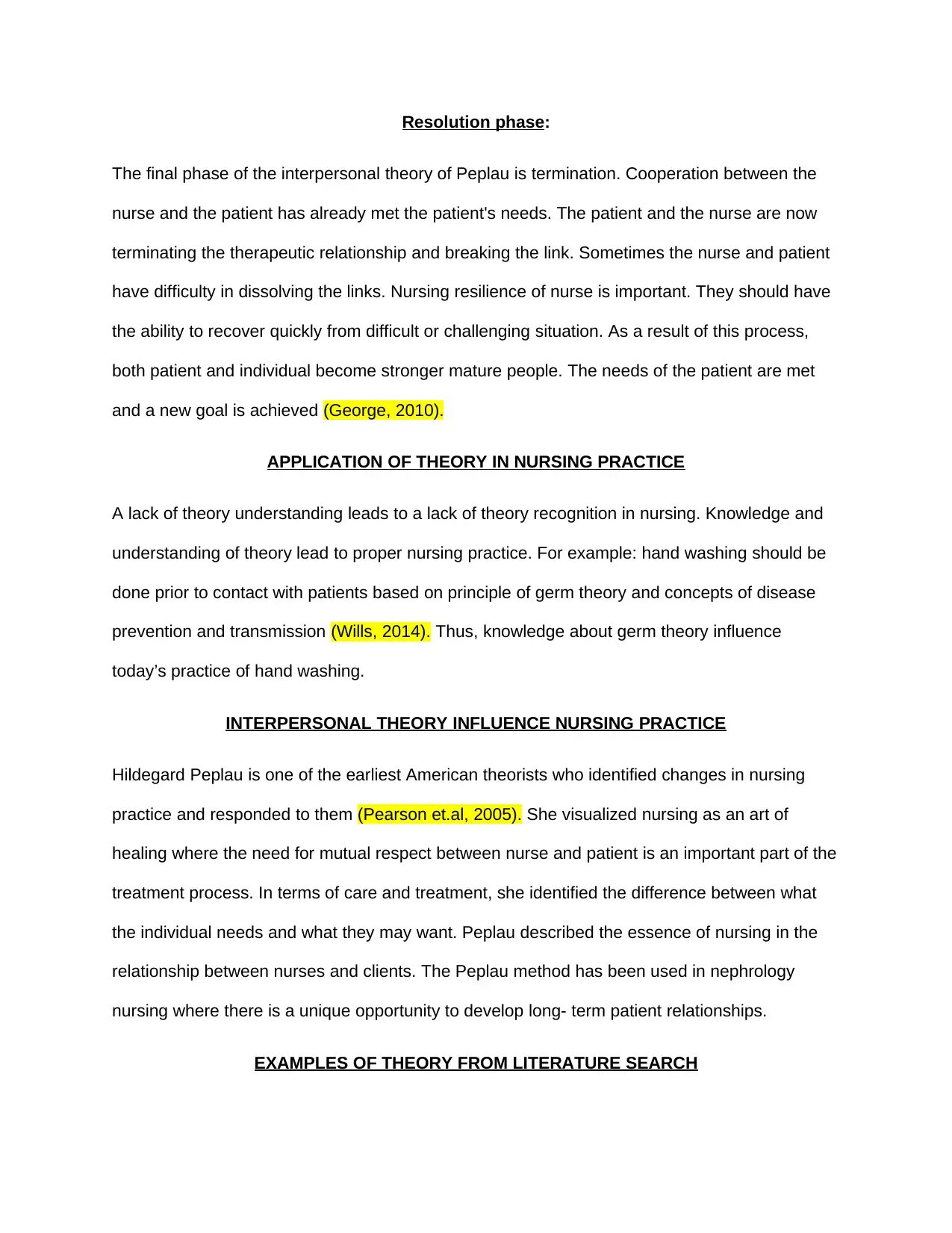
Resolution phase:
The final phase of the interpersonal theory of Peplau is termination. Cooperation between the
nurse and the patient has already met the patient's needs. The patient and the nurse are now
terminating the therapeutic relationship and breaking the link. Sometimes the nurse and patient
have difficulty in dissolving the links. Nursing resilience of nurse is important. They should have
the ability to recover quickly from difficult or challenging situation. As a result of this process,
both patient and individual become stronger mature people. The needs of the patient are met
and a new goal is achieved (George, 2010).
APPLICATION OF THEORY IN NURSING PRACTICE
A lack of theory understanding leads to a lack of theory recognition in nursing. Knowledge and
understanding of theory lead to proper nursing practice. For example: hand washing should be
done prior to contact with patients based on principle of germ theory and concepts of disease
prevention and transmission (Wills, 2014). Thus, knowledge about germ theory influence
today’s practice of hand washing.
INTERPERSONAL THEORY INFLUENCE NURSING PRACTICE
Hildegard Peplau is one of the earliest American theorists who identified changes in nursing
practice and responded to them (Pearson et.al, 2005). She visualized nursing as an art of
healing where the need for mutual respect between nurse and patient is an important part of the
treatment process. In terms of care and treatment, she identified the difference between what
the individual needs and what they may want. Peplau described the essence of nursing in the
relationship between nurses and clients. The Peplau method has been used in nephrology
nursing where there is a unique opportunity to develop long- term patient relationships.
EXAMPLES OF THEORY FROM LITERATURE SEARCH
The final phase of the interpersonal theory of Peplau is termination. Cooperation between the
nurse and the patient has already met the patient's needs. The patient and the nurse are now
terminating the therapeutic relationship and breaking the link. Sometimes the nurse and patient
have difficulty in dissolving the links. Nursing resilience of nurse is important. They should have
the ability to recover quickly from difficult or challenging situation. As a result of this process,
both patient and individual become stronger mature people. The needs of the patient are met
and a new goal is achieved (George, 2010).
APPLICATION OF THEORY IN NURSING PRACTICE
A lack of theory understanding leads to a lack of theory recognition in nursing. Knowledge and
understanding of theory lead to proper nursing practice. For example: hand washing should be
done prior to contact with patients based on principle of germ theory and concepts of disease
prevention and transmission (Wills, 2014). Thus, knowledge about germ theory influence
today’s practice of hand washing.
INTERPERSONAL THEORY INFLUENCE NURSING PRACTICE
Hildegard Peplau is one of the earliest American theorists who identified changes in nursing
practice and responded to them (Pearson et.al, 2005). She visualized nursing as an art of
healing where the need for mutual respect between nurse and patient is an important part of the
treatment process. In terms of care and treatment, she identified the difference between what
the individual needs and what they may want. Peplau described the essence of nursing in the
relationship between nurses and clients. The Peplau method has been used in nephrology
nursing where there is a unique opportunity to develop long- term patient relationships.
EXAMPLES OF THEORY FROM LITERATURE SEARCH
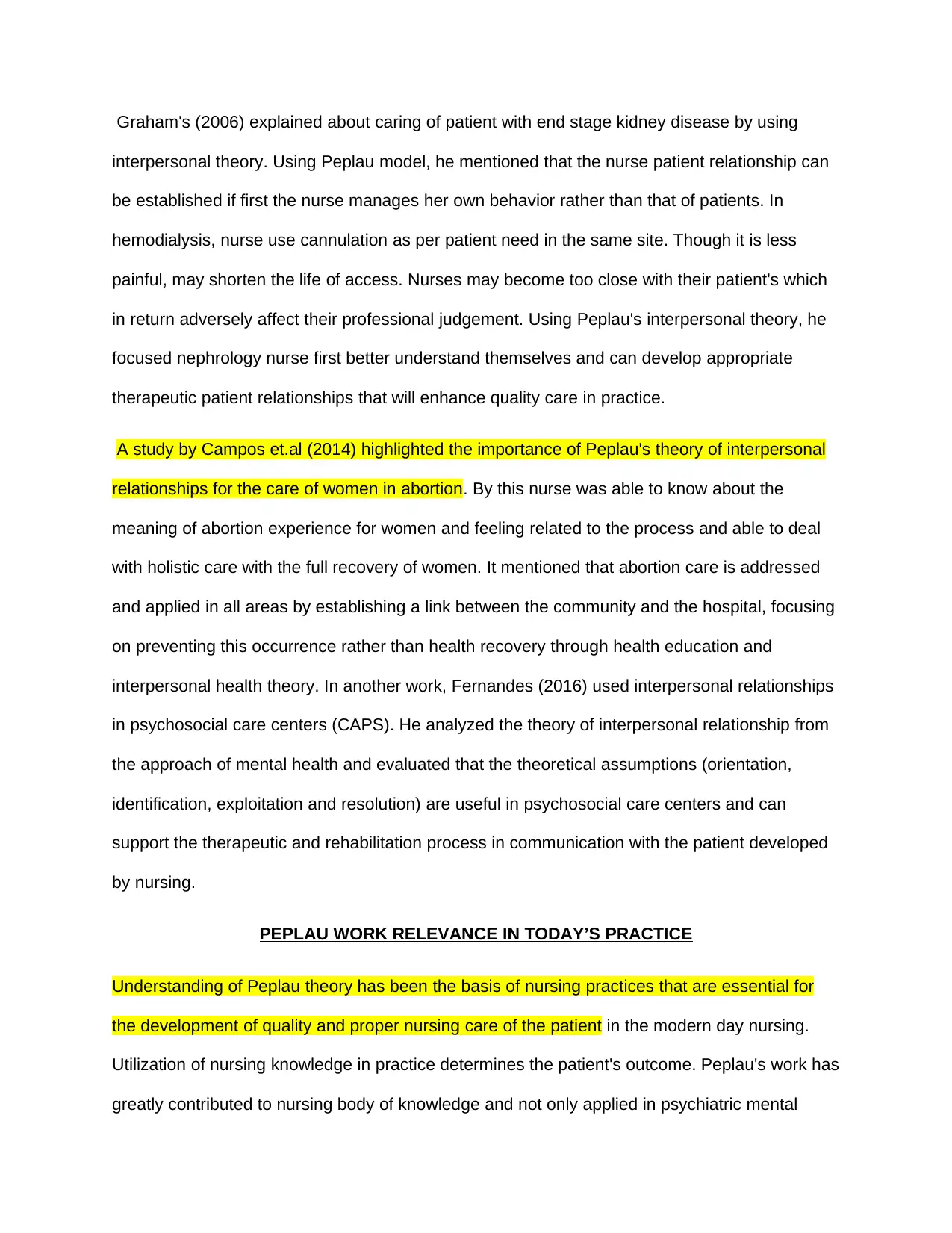
Graham's (2006) explained about caring of patient with end stage kidney disease by using
interpersonal theory. Using Peplau model, he mentioned that the nurse patient relationship can
be established if first the nurse manages her own behavior rather than that of patients. In
hemodialysis, nurse use cannulation as per patient need in the same site. Though it is less
painful, may shorten the life of access. Nurses may become too close with their patient's which
in return adversely affect their professional judgement. Using Peplau's interpersonal theory, he
focused nephrology nurse first better understand themselves and can develop appropriate
therapeutic patient relationships that will enhance quality care in practice.
A study by Campos et.al (2014) highlighted the importance of Peplau's theory of interpersonal
relationships for the care of women in abortion. By this nurse was able to know about the
meaning of abortion experience for women and feeling related to the process and able to deal
with holistic care with the full recovery of women. It mentioned that abortion care is addressed
and applied in all areas by establishing a link between the community and the hospital, focusing
on preventing this occurrence rather than health recovery through health education and
interpersonal health theory. In another work, Fernandes (2016) used interpersonal relationships
in psychosocial care centers (CAPS). He analyzed the theory of interpersonal relationship from
the approach of mental health and evaluated that the theoretical assumptions (orientation,
identification, exploitation and resolution) are useful in psychosocial care centers and can
support the therapeutic and rehabilitation process in communication with the patient developed
by nursing.
PEPLAU WORK RELEVANCE IN TODAY’S PRACTICE
Understanding of Peplau theory has been the basis of nursing practices that are essential for
the development of quality and proper nursing care of the patient in the modern day nursing.
Utilization of nursing knowledge in practice determines the patient's outcome. Peplau's work has
greatly contributed to nursing body of knowledge and not only applied in psychiatric mental
interpersonal theory. Using Peplau model, he mentioned that the nurse patient relationship can
be established if first the nurse manages her own behavior rather than that of patients. In
hemodialysis, nurse use cannulation as per patient need in the same site. Though it is less
painful, may shorten the life of access. Nurses may become too close with their patient's which
in return adversely affect their professional judgement. Using Peplau's interpersonal theory, he
focused nephrology nurse first better understand themselves and can develop appropriate
therapeutic patient relationships that will enhance quality care in practice.
A study by Campos et.al (2014) highlighted the importance of Peplau's theory of interpersonal
relationships for the care of women in abortion. By this nurse was able to know about the
meaning of abortion experience for women and feeling related to the process and able to deal
with holistic care with the full recovery of women. It mentioned that abortion care is addressed
and applied in all areas by establishing a link between the community and the hospital, focusing
on preventing this occurrence rather than health recovery through health education and
interpersonal health theory. In another work, Fernandes (2016) used interpersonal relationships
in psychosocial care centers (CAPS). He analyzed the theory of interpersonal relationship from
the approach of mental health and evaluated that the theoretical assumptions (orientation,
identification, exploitation and resolution) are useful in psychosocial care centers and can
support the therapeutic and rehabilitation process in communication with the patient developed
by nursing.
PEPLAU WORK RELEVANCE IN TODAY’S PRACTICE
Understanding of Peplau theory has been the basis of nursing practices that are essential for
the development of quality and proper nursing care of the patient in the modern day nursing.
Utilization of nursing knowledge in practice determines the patient's outcome. Peplau's work has
greatly contributed to nursing body of knowledge and not only applied in psychiatric mental
⊘ This is a preview!⊘
Do you want full access?
Subscribe today to unlock all pages.

Trusted by 1+ million students worldwide
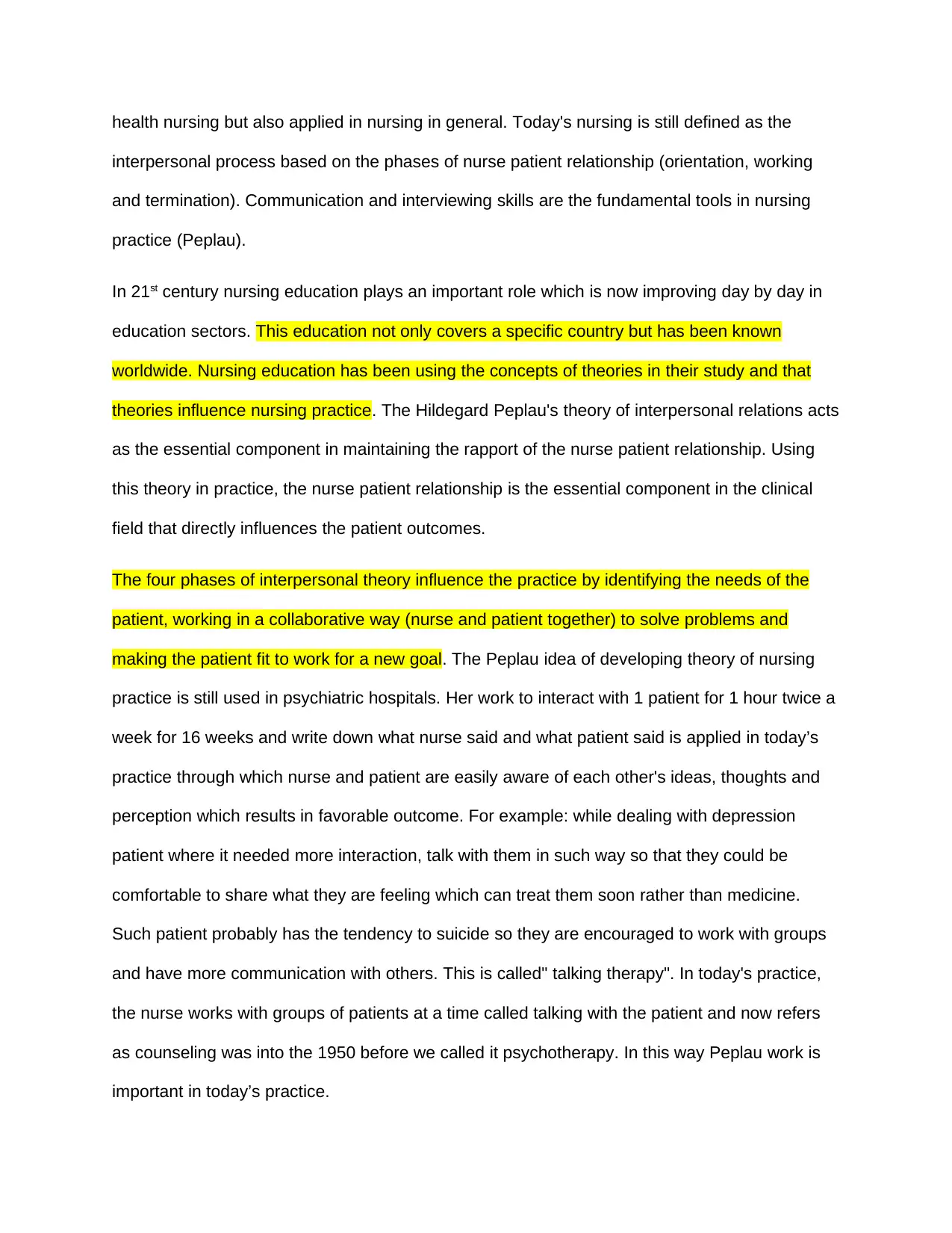
health nursing but also applied in nursing in general. Today's nursing is still defined as the
interpersonal process based on the phases of nurse patient relationship (orientation, working
and termination). Communication and interviewing skills are the fundamental tools in nursing
practice (Peplau).
In 21st century nursing education plays an important role which is now improving day by day in
education sectors. This education not only covers a specific country but has been known
worldwide. Nursing education has been using the concepts of theories in their study and that
theories influence nursing practice. The Hildegard Peplau's theory of interpersonal relations acts
as the essential component in maintaining the rapport of the nurse patient relationship. Using
this theory in practice, the nurse patient relationship is the essential component in the clinical
field that directly influences the patient outcomes.
The four phases of interpersonal theory influence the practice by identifying the needs of the
patient, working in a collaborative way (nurse and patient together) to solve problems and
making the patient fit to work for a new goal. The Peplau idea of developing theory of nursing
practice is still used in psychiatric hospitals. Her work to interact with 1 patient for 1 hour twice a
week for 16 weeks and write down what nurse said and what patient said is applied in today’s
practice through which nurse and patient are easily aware of each other's ideas, thoughts and
perception which results in favorable outcome. For example: while dealing with depression
patient where it needed more interaction, talk with them in such way so that they could be
comfortable to share what they are feeling which can treat them soon rather than medicine.
Such patient probably has the tendency to suicide so they are encouraged to work with groups
and have more communication with others. This is called" talking therapy". In today's practice,
the nurse works with groups of patients at a time called talking with the patient and now refers
as counseling was into the 1950 before we called it psychotherapy. In this way Peplau work is
important in today’s practice.
interpersonal process based on the phases of nurse patient relationship (orientation, working
and termination). Communication and interviewing skills are the fundamental tools in nursing
practice (Peplau).
In 21st century nursing education plays an important role which is now improving day by day in
education sectors. This education not only covers a specific country but has been known
worldwide. Nursing education has been using the concepts of theories in their study and that
theories influence nursing practice. The Hildegard Peplau's theory of interpersonal relations acts
as the essential component in maintaining the rapport of the nurse patient relationship. Using
this theory in practice, the nurse patient relationship is the essential component in the clinical
field that directly influences the patient outcomes.
The four phases of interpersonal theory influence the practice by identifying the needs of the
patient, working in a collaborative way (nurse and patient together) to solve problems and
making the patient fit to work for a new goal. The Peplau idea of developing theory of nursing
practice is still used in psychiatric hospitals. Her work to interact with 1 patient for 1 hour twice a
week for 16 weeks and write down what nurse said and what patient said is applied in today’s
practice through which nurse and patient are easily aware of each other's ideas, thoughts and
perception which results in favorable outcome. For example: while dealing with depression
patient where it needed more interaction, talk with them in such way so that they could be
comfortable to share what they are feeling which can treat them soon rather than medicine.
Such patient probably has the tendency to suicide so they are encouraged to work with groups
and have more communication with others. This is called" talking therapy". In today's practice,
the nurse works with groups of patients at a time called talking with the patient and now refers
as counseling was into the 1950 before we called it psychotherapy. In this way Peplau work is
important in today’s practice.
Paraphrase This Document
Need a fresh take? Get an instant paraphrase of this document with our AI Paraphraser
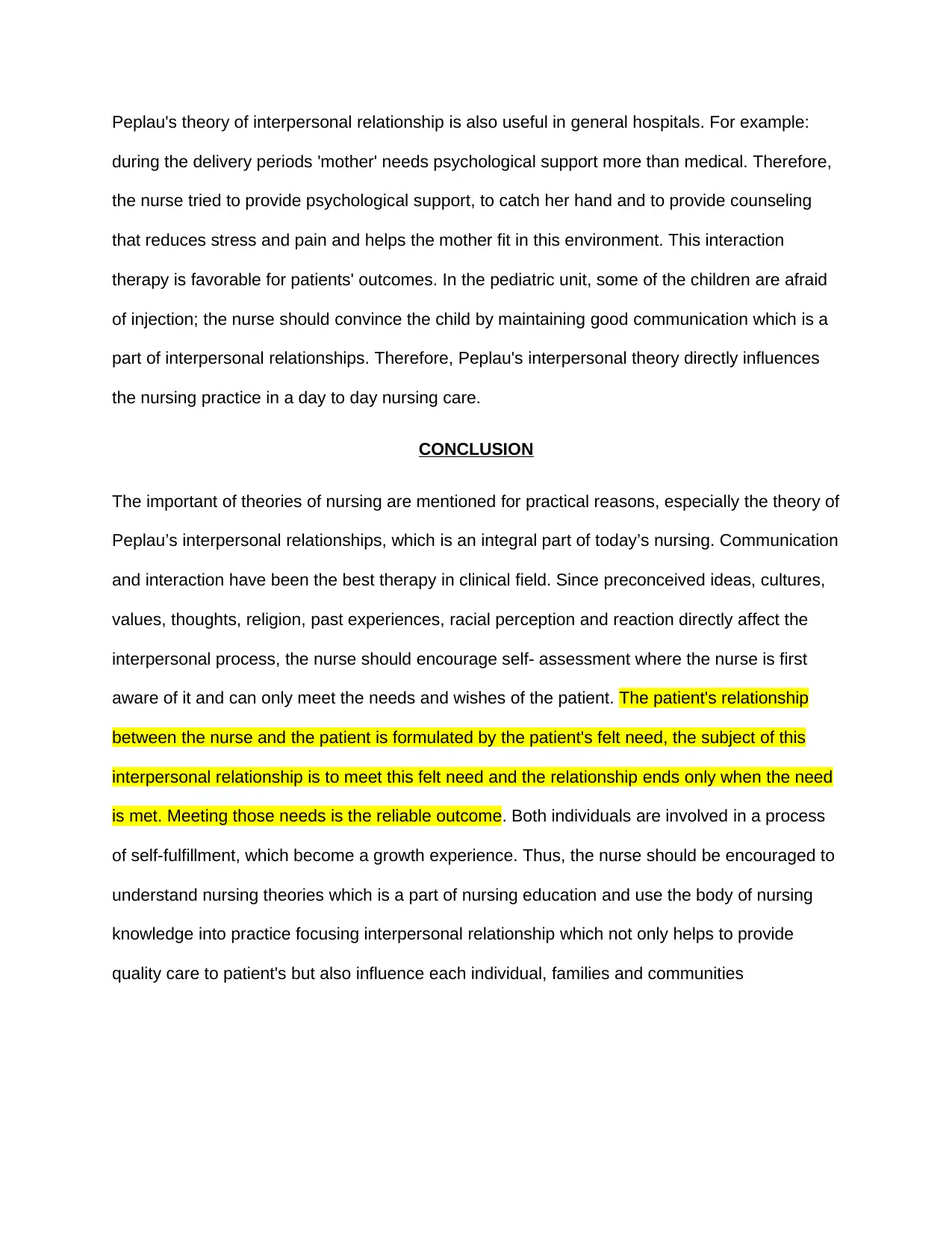
Peplau's theory of interpersonal relationship is also useful in general hospitals. For example:
during the delivery periods 'mother' needs psychological support more than medical. Therefore,
the nurse tried to provide psychological support, to catch her hand and to provide counseling
that reduces stress and pain and helps the mother fit in this environment. This interaction
therapy is favorable for patients' outcomes. In the pediatric unit, some of the children are afraid
of injection; the nurse should convince the child by maintaining good communication which is a
part of interpersonal relationships. Therefore, Peplau's interpersonal theory directly influences
the nursing practice in a day to day nursing care.
CONCLUSION
The important of theories of nursing are mentioned for practical reasons, especially the theory of
Peplau’s interpersonal relationships, which is an integral part of today’s nursing. Communication
and interaction have been the best therapy in clinical field. Since preconceived ideas, cultures,
values, thoughts, religion, past experiences, racial perception and reaction directly affect the
interpersonal process, the nurse should encourage self- assessment where the nurse is first
aware of it and can only meet the needs and wishes of the patient. The patient's relationship
between the nurse and the patient is formulated by the patient's felt need, the subject of this
interpersonal relationship is to meet this felt need and the relationship ends only when the need
is met. Meeting those needs is the reliable outcome. Both individuals are involved in a process
of self-fulfillment, which become a growth experience. Thus, the nurse should be encouraged to
understand nursing theories which is a part of nursing education and use the body of nursing
knowledge into practice focusing interpersonal relationship which not only helps to provide
quality care to patient's but also influence each individual, families and communities
during the delivery periods 'mother' needs psychological support more than medical. Therefore,
the nurse tried to provide psychological support, to catch her hand and to provide counseling
that reduces stress and pain and helps the mother fit in this environment. This interaction
therapy is favorable for patients' outcomes. In the pediatric unit, some of the children are afraid
of injection; the nurse should convince the child by maintaining good communication which is a
part of interpersonal relationships. Therefore, Peplau's interpersonal theory directly influences
the nursing practice in a day to day nursing care.
CONCLUSION
The important of theories of nursing are mentioned for practical reasons, especially the theory of
Peplau’s interpersonal relationships, which is an integral part of today’s nursing. Communication
and interaction have been the best therapy in clinical field. Since preconceived ideas, cultures,
values, thoughts, religion, past experiences, racial perception and reaction directly affect the
interpersonal process, the nurse should encourage self- assessment where the nurse is first
aware of it and can only meet the needs and wishes of the patient. The patient's relationship
between the nurse and the patient is formulated by the patient's felt need, the subject of this
interpersonal relationship is to meet this felt need and the relationship ends only when the need
is met. Meeting those needs is the reliable outcome. Both individuals are involved in a process
of self-fulfillment, which become a growth experience. Thus, the nurse should be encouraged to
understand nursing theories which is a part of nursing education and use the body of nursing
knowledge into practice focusing interpersonal relationship which not only helps to provide
quality care to patient's but also influence each individual, families and communities
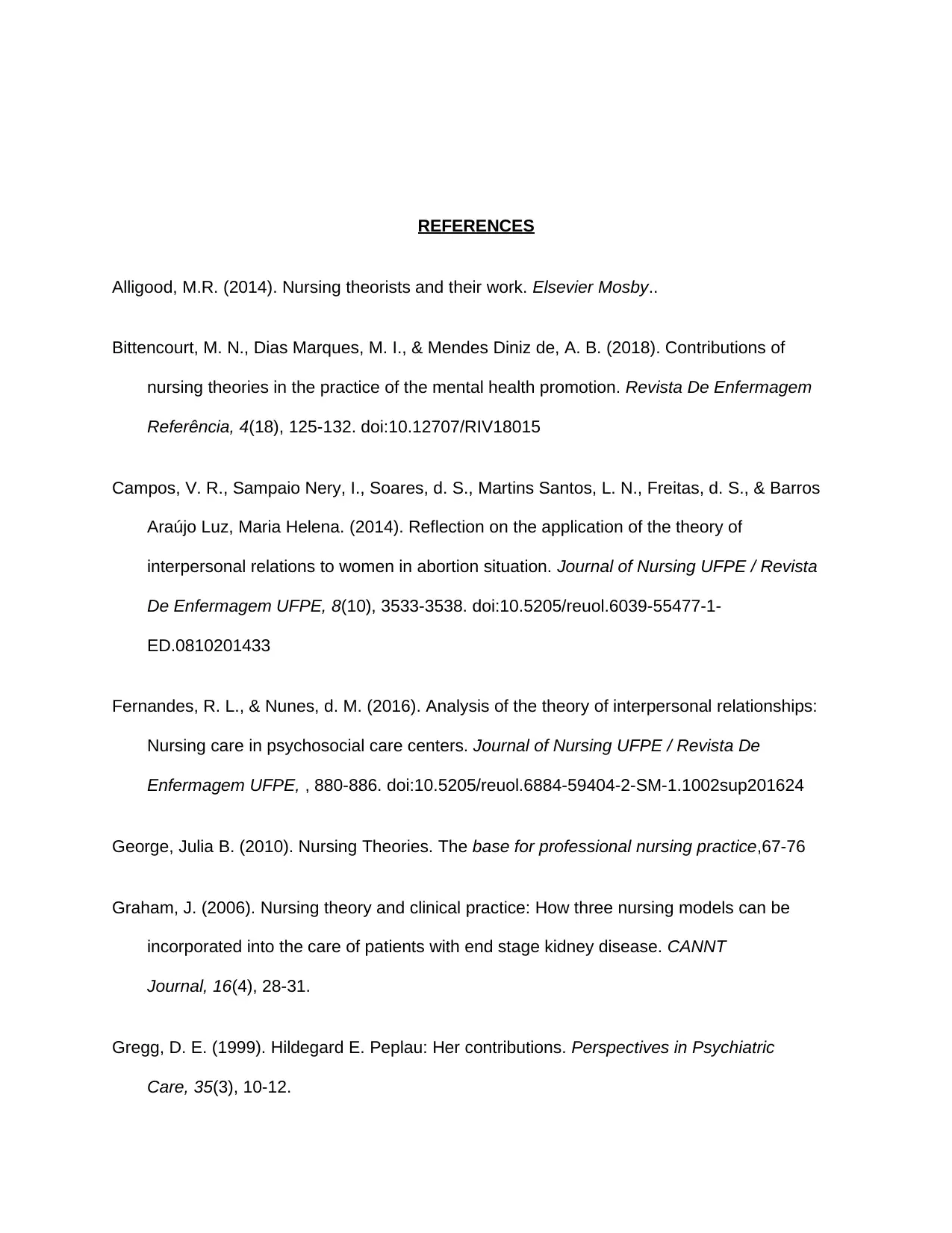
REFERENCES
Alligood, M.R. (2014). Nursing theorists and their work. Elsevier Mosby..
Bittencourt, M. N., Dias Marques, M. I., & Mendes Diniz de, A. B. (2018). Contributions of
nursing theories in the practice of the mental health promotion. Revista De Enfermagem
Referência, 4(18), 125-132. doi:10.12707/RIV18015
Campos, V. R., Sampaio Nery, I., Soares, d. S., Martins Santos, L. N., Freitas, d. S., & Barros
Araújo Luz, Maria Helena. (2014). Reflection on the application of the theory of
interpersonal relations to women in abortion situation. Journal of Nursing UFPE / Revista
De Enfermagem UFPE, 8(10), 3533-3538. doi:10.5205/reuol.6039-55477-1-
ED.0810201433
Fernandes, R. L., & Nunes, d. M. (2016). Analysis of the theory of interpersonal relationships:
Nursing care in psychosocial care centers. Journal of Nursing UFPE / Revista De
Enfermagem UFPE, , 880-886. doi:10.5205/reuol.6884-59404-2-SM-1.1002sup201624
George, Julia B. (2010). Nursing Theories. The base for professional nursing practice,67-76
Graham, J. (2006). Nursing theory and clinical practice: How three nursing models can be
incorporated into the care of patients with end stage kidney disease. CANNT
Journal, 16(4), 28-31.
Gregg, D. E. (1999). Hildegard E. Peplau: Her contributions. Perspectives in Psychiatric
Care, 35(3), 10-12.
Alligood, M.R. (2014). Nursing theorists and their work. Elsevier Mosby..
Bittencourt, M. N., Dias Marques, M. I., & Mendes Diniz de, A. B. (2018). Contributions of
nursing theories in the practice of the mental health promotion. Revista De Enfermagem
Referência, 4(18), 125-132. doi:10.12707/RIV18015
Campos, V. R., Sampaio Nery, I., Soares, d. S., Martins Santos, L. N., Freitas, d. S., & Barros
Araújo Luz, Maria Helena. (2014). Reflection on the application of the theory of
interpersonal relations to women in abortion situation. Journal of Nursing UFPE / Revista
De Enfermagem UFPE, 8(10), 3533-3538. doi:10.5205/reuol.6039-55477-1-
ED.0810201433
Fernandes, R. L., & Nunes, d. M. (2016). Analysis of the theory of interpersonal relationships:
Nursing care in psychosocial care centers. Journal of Nursing UFPE / Revista De
Enfermagem UFPE, , 880-886. doi:10.5205/reuol.6884-59404-2-SM-1.1002sup201624
George, Julia B. (2010). Nursing Theories. The base for professional nursing practice,67-76
Graham, J. (2006). Nursing theory and clinical practice: How three nursing models can be
incorporated into the care of patients with end stage kidney disease. CANNT
Journal, 16(4), 28-31.
Gregg, D. E. (1999). Hildegard E. Peplau: Her contributions. Perspectives in Psychiatric
Care, 35(3), 10-12.
⊘ This is a preview!⊘
Do you want full access?
Subscribe today to unlock all pages.

Trusted by 1+ million students worldwide
1 out of 14
Related Documents
Your All-in-One AI-Powered Toolkit for Academic Success.
+13062052269
info@desklib.com
Available 24*7 on WhatsApp / Email
![[object Object]](/_next/static/media/star-bottom.7253800d.svg)
Unlock your academic potential
Copyright © 2020–2026 A2Z Services. All Rights Reserved. Developed and managed by ZUCOL.





